Theatre Review
The Classic Theatre
The Gift of the Magi
There’s a new theatre group in our area, and though you’ve missed their debut round of sold-out performances, based on what I saw this night, you will want to be alert to their next offering.
The Classic Theatre is a subsidiary of PPC Entertainment, a 501(c)3
nonprofit corporation that is also the parent organization of
The Placer Pops Chorale & Orchestra.
“The Gift of the Magi” is the first project of The Classic Theatre, and
with the success of this first venture, plans are underway for a
subsequent project. You can get a lot of insight into this show if
you’ll check out
The Classic Theatre on Instagram.
There is an abundance of photos and videos that illustrate how the show
was put together: tour of the venue, cast pictures, videos of
rehearsals, pictures of scenes in the show, promotional clips, video of
the costumer’s work, and other images suggestive of the play and its
time.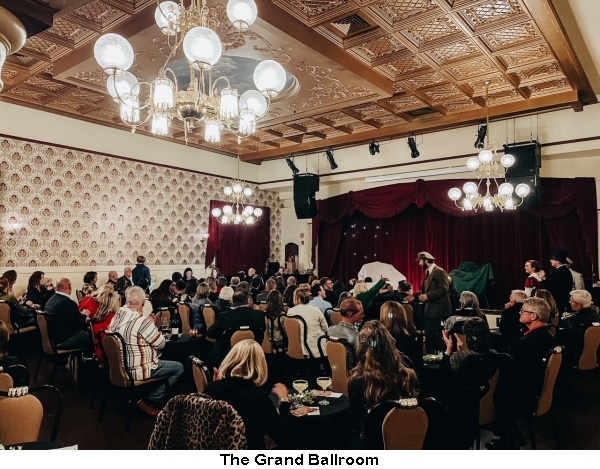
But let me tell you about my personal experience with their production of “The Gift of the Magi,” starting with the venue. I’m sure there is a fascinating history behind Oliver’s Brewhouse. Unfortunately, there’s nothing about it in the restaurant’s website. It’s located on Fifth Street in Lincoln, sandwiched among other businesses. But I’ll venture that none of them have 3 stories and a Grand Ballroom. And I must say that the Grand Ballroom is indeed grand, with a stage and balcony overlooking the floor, and impressive walls, ceiling and chandeliers.
I attended the show in the middle of the production run, a Wednesday night with an atmospheric river threatening. When I arrived, I was directed up a steep stairway (an elevator was available but not mentioned) to the second floor. It was a half-hour before the start of the show, and already people were crowded elbow to elbow, waiting for the “house” to open. There was an elaborate, well-furnished bar near the closed door to the Grand Ballroom, and most patrons were holding drinks, trying not to spill them because of the crowding.
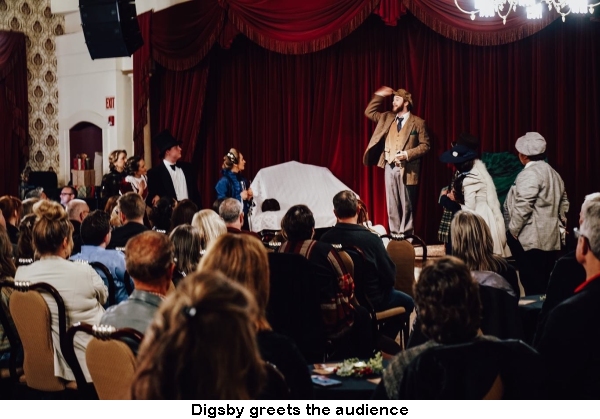 We
patrons had been given numbered tickets to control entry, like the
boarding of an airplane, and initially we were admitted in groups of 10.
As we entered, actors in period costumes were positioned casually around
the room, and an instrumental ensemble of 6 was playing holiday music.
We took our seats in chairs arranged in about 8 rows of 16 for a total
of about 130 in this sold-out house. Most of the audience brought their
drinks with them.
We
patrons had been given numbered tickets to control entry, like the
boarding of an airplane, and initially we were admitted in groups of 10.
As we entered, actors in period costumes were positioned casually around
the room, and an instrumental ensemble of 6 was playing holiday music.
We took our seats in chairs arranged in about 8 rows of 16 for a total
of about 130 in this sold-out house. Most of the audience brought their
drinks with them.
While the room was still filling, we were warmly greeted by Nick
Hancock as “Digsby” with what sounded like a Boston Irish accent. He
entertained us with a song, and for the next 15 minutes or, so different
combinations of the initial cast of 6 sang seasonal music. They were
accompanied by the instrumentalists, and although their casualness made
it all appear spontaneous, the music was tightly arranged and
professionally performed. Eventually, the singing moved from the floor
to the stage and involved a bit of choreography.
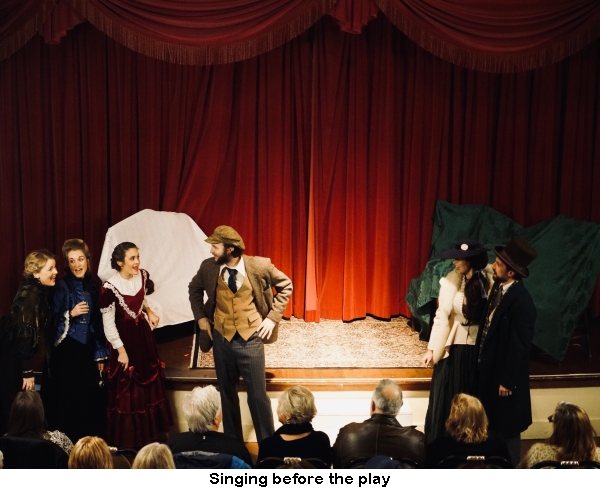
Before going further, a reminder of the plot of “The Gift of the Magi.” Two poor newlyweds have only two things of value between them: for Jim, it’s his gold watch; for Della, it’s her long, luxurious hair. Without the necessary money, they still want to give each other special Christmas presents. So he sells his watch to buy combs for her hair. But she sells her hair to buy a fob for his watch.
(Click here to open, in a new window, a list of everyone involved in this show)
The idea behind this production was to give the audience an immersive theatrical experience, hence the welcome, a bit of banter and the singing. At 7:15 the elements of drama began with the arrival (from behind the audience) of Jim and Della, the couple at the center of the story of “The Gift of the Magi.” We were given to understand that the year was 1915, and we were witnessing a joyful reunion of Della and her sister, plus a group of friends. They spoke of Della’s having been “bald” and presently the action began on earnest on the stage. The time was now 1905, and we saw Jim and Della in a humble apartment with an old loveseat, a fireplace, two straight chairs ─ and a meager Christmas tree.
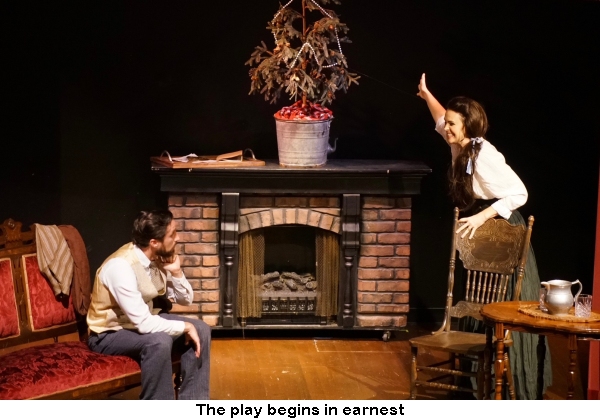 The
script for this production was Jon Jory’s adaptation of O. Henry’s short
story, “The Gift of the Magi.” Jory’s take on the story is that it is
being narrated by a group of Christmas carolers. Accordingly, throughout
the evening we were treated to a variety of holiday songs woven into the
action. For example, as Jim and Della decorated their poor tree, a
quartet sang “Silent Night.” I must add that the music was excellent.
First, there were the professional players who were part of the Placer
Pops standing orchestra. Then, it has to be said that each performer was
a strong singer and ─ more than that
─ a talented singing actor. And all the
music showed the experienced hand of Music Director, Lorin Miller, who
has been the Artistic and Musical Director of the Placer Pops Chorale
for the past 18 years.
The
script for this production was Jon Jory’s adaptation of O. Henry’s short
story, “The Gift of the Magi.” Jory’s take on the story is that it is
being narrated by a group of Christmas carolers. Accordingly, throughout
the evening we were treated to a variety of holiday songs woven into the
action. For example, as Jim and Della decorated their poor tree, a
quartet sang “Silent Night.” I must add that the music was excellent.
First, there were the professional players who were part of the Placer
Pops standing orchestra. Then, it has to be said that each performer was
a strong singer and ─ more than that
─ a talented singing actor. And all the
music showed the experienced hand of Music Director, Lorin Miller, who
has been the Artistic and Musical Director of the Placer Pops Chorale
for the past 18 years.
Throughout the production, it was clear that a lot of thought had been given to creating period costumes (see the Instagram video), with realistic touches like the obvious tear in Della’s old shawl. There were also many appropriate props to enhance the production value of the show. One small, charming example of these was the initial scrawny Christmas tree, which was set in a tub. A nearly invisible wire was attached to it, causing it to lean pitifully on cue.
The story we were witnessing was not carried exclusively by the
dramatic action. One of the cast members would occasionally break in to
comment on what we had seen or were about to see, to note the passage of
time, etc. Sometimes the house lights even went up for these
explanations. I think it was one of these moments when a character, who
was out of the scene, summarized the moral of the story (and I think it
came after Della was counting her money): “Does any sum amount to
happiness? Why must we always be counting?”
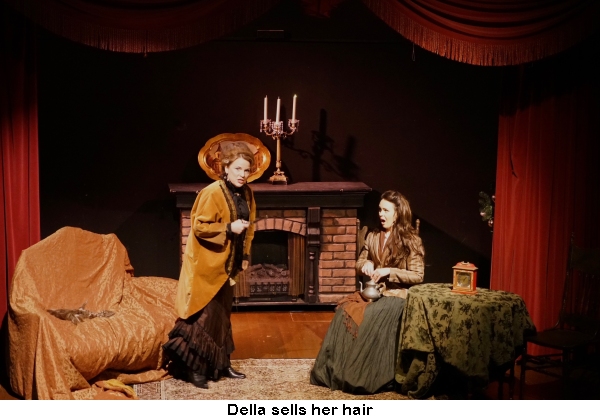
I believe it was at this point in the show that the cast sang one particularly interesting song that I had never heard before: “The World for Christmas.” It starts with the words of Clement Moore’s poem, “A Visit from St. Nicholas” (or what we know as “The Night Before Christmas”). But then it takes a bittersweet tone, suggesting a Christmas wish for a kinder, less materialistic, more sustainable world ─ so appropriate to the moral of the present story. Click here to view the words in this song in a new window.
The story unfolding before the audience was full of heartwarming moments, such as demonstration of the love between the newlyweds or the occasion when Della unreservedly gives a loan she couldn’t afford to an even needier friend, or when the shopkeeper relents on the price he would charge for a gold watch fob. There were also quite a few humorous moments, such as when Digsby throws Jim over his shoulder to carry him away to celebrate or when he playfully pours water over his head. The dialog itself generated frequent laughs among the audience.
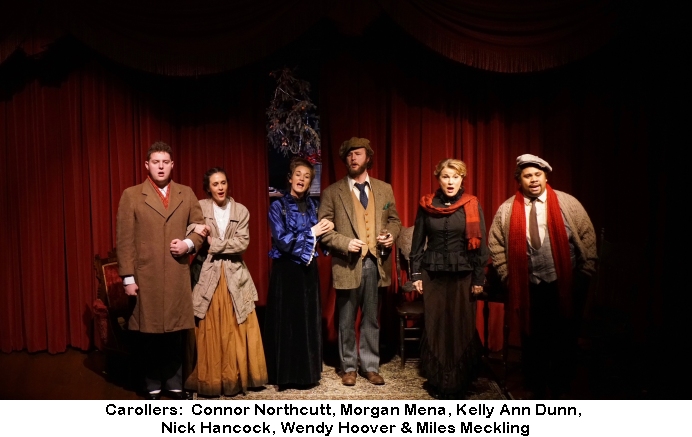 The
stage was small and the curtain didn’t close until the end of the show,
so scene changes were accomplished by movement of set pieces (often
while there was singing), or switching the scene to the floor in front
of the stage. Still, they seemed to have no choice in changing the shops
visited by Della but to have an actor hold a sign with the shop name and
then flip it for the name of the next shop. But what made all this more
or less transparent in the minds of the audience was the energetic
activity of the players. And whether frenetic or calm, I thought the
acting was excellent, giving us an array of likeable, believable
characters. There were also some interesting special
characterizations, together with accents, for the shopkeeper who bought
Della’s hair or the shopkeeper who sold her the watch fob.
The
stage was small and the curtain didn’t close until the end of the show,
so scene changes were accomplished by movement of set pieces (often
while there was singing), or switching the scene to the floor in front
of the stage. Still, they seemed to have no choice in changing the shops
visited by Della but to have an actor hold a sign with the shop name and
then flip it for the name of the next shop. But what made all this more
or less transparent in the minds of the audience was the energetic
activity of the players. And whether frenetic or calm, I thought the
acting was excellent, giving us an array of likeable, believable
characters. There were also some interesting special
characterizations, together with accents, for the shopkeeper who bought
Della’s hair or the shopkeeper who sold her the watch fob.
One of many highlights in the show was the climax when Della and Jim are exchanging their gifts. It wasn’t sad or depressing, but cute and funny ─ even manic, leaving the story on a high note. Then the curtain was finally closed, and all 8 players sang the last verse of “The Twelve Days of Christmas.” After this, everyone in the audience was quickly on their feet, applauding and cheering, grateful for a charming story, artfully told with 45 minutes of good fellowship. This show was a demonstration of what the principals of The Classic Theatre are capable of. In their Facebook page, they say they are bringing back "an old-school style of professional regional theatre," adding "We do classics. We make classics." I, for one, am anxious to see what they will do next.
Follow The Classic Theatre on the Web, on Facebook or on Instagram.
Dick Frantzreb is editor of the Capital Region Performance Gallery. He also edits the Sacramento Choral Calendar and the Placer Performance Calendar, and he was a co-founder and past President of the Sacramento Valley Choral Coalition. He has been loving live performances in the greater Sacramento area and writing about them since 2012.